News & Headlines
View office hours for all faculty
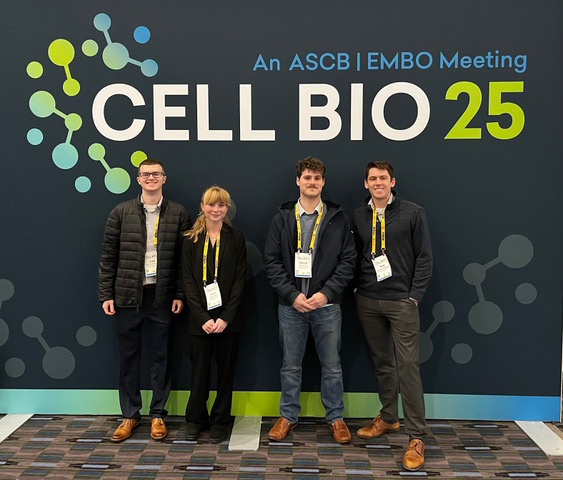
Dr. Kwiatkowski and group present at ASCB/EMBO Cell Bio 25
Biochemistry students Jillian Snyder, Cole Stefencavage, and Daniel Ford from Dr. Kwiatkowski’s lab presented their research projects at one of the world’s largest international conferences in cell biology, the American Society for Cell Biology (ASCB) and European Molecular Biology Organization (EMBO) meeting.
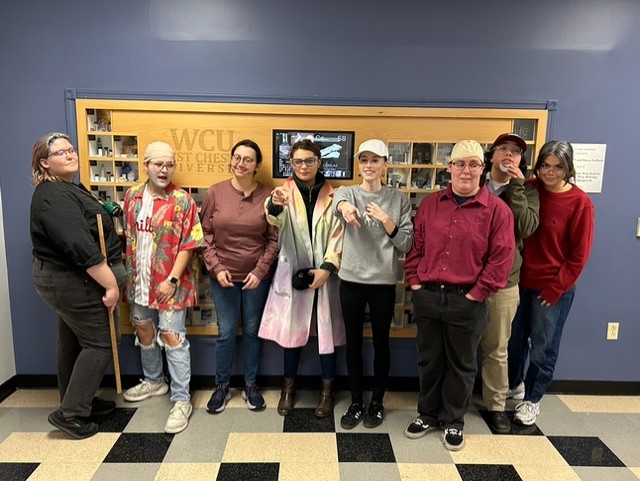
Strange Outbreak of Alchemy on Halloween
The Periodic Table of the Elements remains the same but looking closely at the faculty, the usual laws of chemistry appear to take a turn toward the Alchemists.
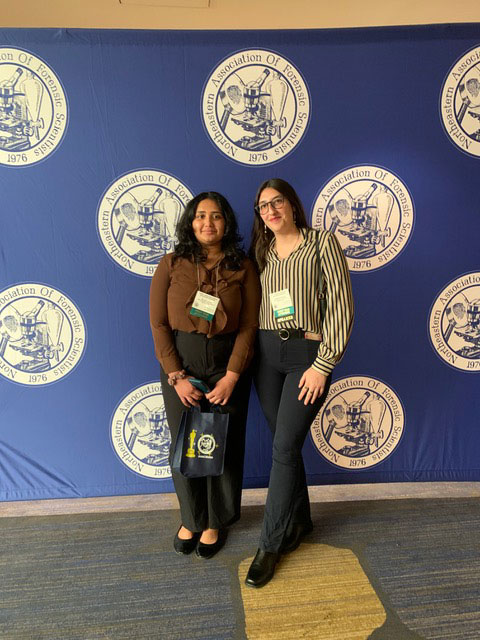
Student Presentations at Northeastern Association of Forensic Scientists (NEAFS)
Katherine Hayner (WCU student) present results with co-authors Revathi Variar (WCU student), Lisa Mundy (Philadelphia Medical Examiner’s Office), and Dr. Constantinos Pistos (WCU) at the 51st Annual Meeting of Northeastern Association of Forensic Scientists, in Lancaster, PA. The title of the oral presentation was “Method development for the determination of Fentanyl and its cutting agents in whole blood using LC-MS/MS.”
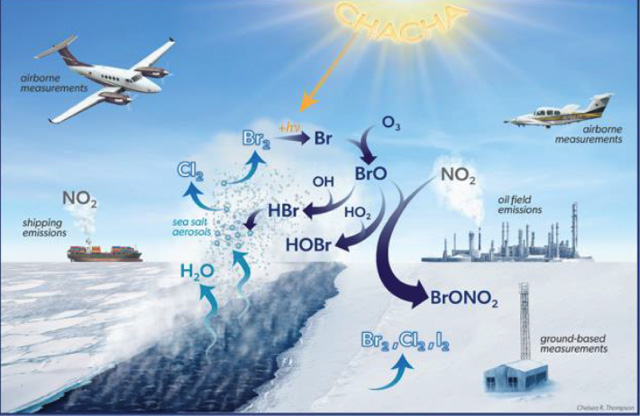
Dr. Starn publishes the results of a field project in the Arctic
Given the rapid pace of physical and chemical changes occurring in the Arctic, and the critical yet insufficiently understood roles of atmospheric turbulence, chemistry, and aerosol cloud feedbacks, the CHACHA project aimed to enhance understanding of the processes governing vertical variability of halogens and aerosols and, in turn, improve predictive capabilities for the Arctic’s physical and chemical state, both now and in the future. This article, which can be found at this link, describes a field project designed to investigate impacts of Arctic sea ice leads and emissions from oil and gas extraction on air chemistry and cloud microphysical properties.
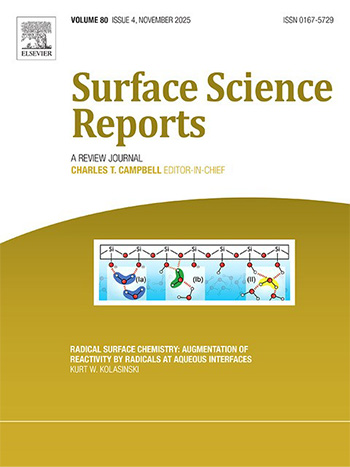
Radical Surface Chemistry: Dr Kolasinski's review article on the chemistry of interfacial water makes the cover of Surface Science Reports
This review published in Surface Science Reports explores the unexpected chemistry associated with ambient temperature aqueous interfaces much of which is mediated not only by ions and neutrals as expected, but also radical species. Water microdroplets catalyze numerous reactions and can also support simultaneous oxidation and reduction reactions through the production of reactive intermediates that owe their existence to the unique influence of the air/water or oil/water interface. Interfacial water influences and is influenced by the ubiquitous phenomenon of contact electrification, a manifestation of spontaneous symmetry breaking. The mechanisms of chemistry not only on and in microdroplets but also at the gas/solid and liquid/solid interfaces rely on a broad set of chemical transformations mediated by radicals. Furthermore, because aqueous macro- and micro-interfaces are ubiquitous on Earth, we find that water radical-mediated chemistry has applications to atmospheric chemistry, geochemistry, mineral weathering, pre-biotic chemistry, enhanced enzyme performance, wastewater remediation, public health, mechanochemistry, and potentially novel routes to pharmaceuticals.
Dr. Starn published new results in atmospheric chemistry
Collaborating with researchers from several institutions, Dr. Tim Starn has studied the release of greenhouse gases from the Prudehome Bay Oil Field in Alaska. Many recent US studies have shown that emissions of methane, a greenhouse gas with 83 times the short-term warming impact of carbon dioxide, from oil and gas production regions are significantly underestimated by the Environmental Protection Agency (EPA). The Prudhoe Bay Oil Field is one of the 10 largest oil fields in the US with only one recent study reporting on its emissions. The Arctic produces 5.5% of global oil and gas with significant potential for growth, but many Arctic sites are poorly studied or inaccessible to scientists. We present measured emission rates of carbon dioxide, methane, and nitrogen oxides from the Prudhoe Bay Oil Field in the spring of 2022. Nitrogen oxides are a combustion byproduct that are respiratory irritants and precursors to ozone and particulate matter, both “criteria” pollutants regulated by the U.S. Clean Air Act. The nitrogen oxides can impact the chemistry and composition of the atmosphere. Unlike previous works in other U.S. states, our results show good agreement with EPA estimates for the greenhouse gases. Our results provide an important snapshot as Alaska begins significantly expanding its oil production and starts exporting natural gas for the first time.
PPD Seminar
Dr. Keith Hornberger, Vice President of Chemistry at Arvinas, will provide a presentation on exciting research advances in the relatively new area of PROTAC research and development titled, "PROTAC Protein Degraders: Past, Present, and Future." This seminar will be held in SCL 151 from 6:00-7:15 PM on Wednesday, October 2. Snacks and a meet and greet with the speaker will be 5:40-6:00 PM. Career opportunities for science majors (especially PPD, Chemistry and Biology based majors) will also be discussed.
Arvinas is a clinical-stage biopharmaceutical company dedicated to improving the lives of patients suffering from debilitating and life-threatening diseases through the discovery, development, and commercialization of therapies that degrade disease-causing proteins. Arvinas uses its proprietary PROTAC® Discovery Engine platform to engineer proteolysis targeting chimeras, or PROTAC® targeted protein degraders, that are designed to harness the body’s own natural protein disposal system to selectively and efficiently degrade and remove disease-causing proteins.
Student research featured in the Quad
Electrocatalysts and the Future of Fuel is the area of research that Jake Gallahan, a WCU chemistry major is pursuing in Dr. Danielle Chirdon's lab. The research has been featured in an article written for the Quad by WCU chemistry major Gabrielle Joyce. Funded by the Jean Dreyfus Lectureship Grant, the pair are investigating the use of molybdenum complexes to generate hydrogen gas by electrocatalytically splitting water.
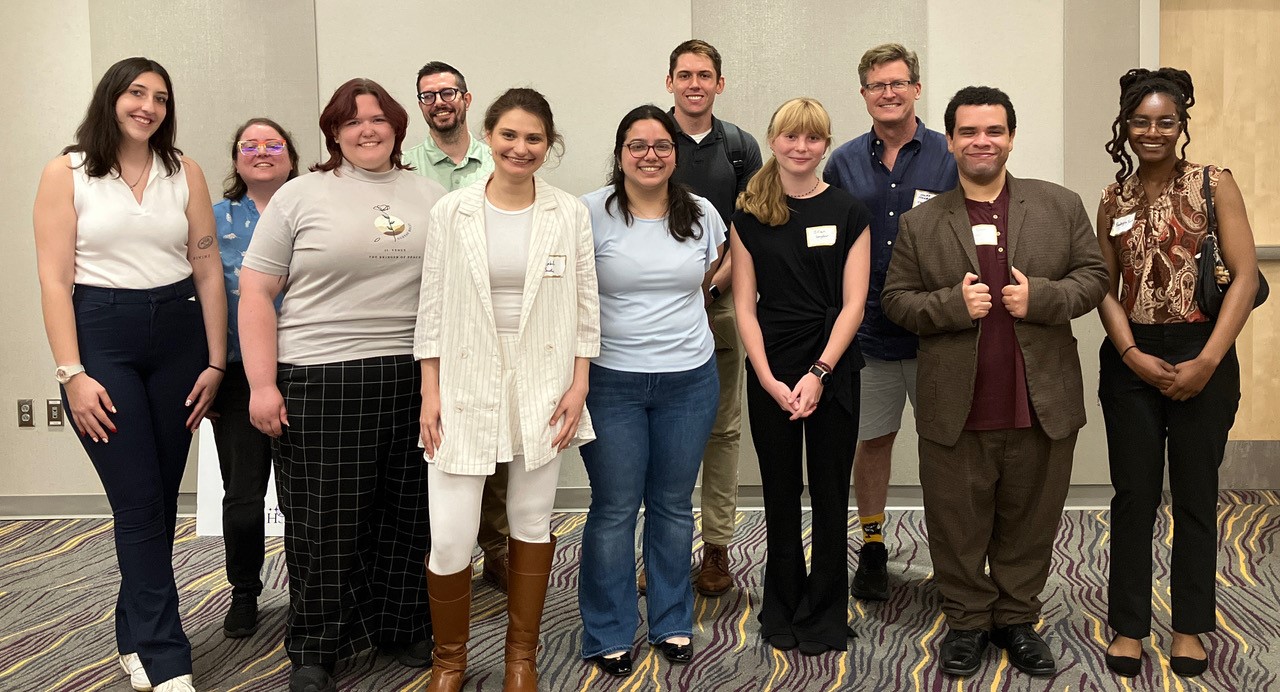
Summer Undergraduate Research Institute (SURI) 2025
Congratulations of to the Chemistry Department's seven SURI scholars. The SURI program supports 5 week long faculty-directed independent research projects and is one of the Office of Research and Sponsored programs flagship events. Poster and and short oral presentations are used to convey the results of their work. 2025 SURI Awardees (Advisors) and topics are
Katherine Drummond (Dr. Kolasinski), Spontaneous evolution of hydrogen peroxide from partially oxidized porous silicon
Shakyra Ford (Dr. Ganas), Microwave assisted synthesis of N-doped carbon quantum dots
Katherine Hayner (Dr. Pistos), Development of a LC-MS/MS method for the determination of fentanyl cutting agents in whole blood
Madelyne Salgado (Dr. Voras), Forensic analysis of a wounded book held in WCU special collections
Arabella Sawaked (Dr. Ganas), Sustainable synthesis of a nanodiamond: Cellulose aerogel composite material
Jillian Snyder (Dr. Kwiatkowski), Effects of alcohol and nicotine E-cigarette co-exposure on biochemical changes in developing mice
Devon Womack (Dr. Kwiatkowski), Effects of alcohol and nicotine co-exposure on serum triglycerides in developing mice and their microbiota
Dr. Chirdon awarded Petroleum Research Fund Grant
Dr. Danielle Chirdon has been awarded supplemental award to her American Chemical Society's Petroleum Research Fund grant. This grant will support her work in studying small molecule complexes in heterogeneous catalysts as announced in Chemical & Engineering News.
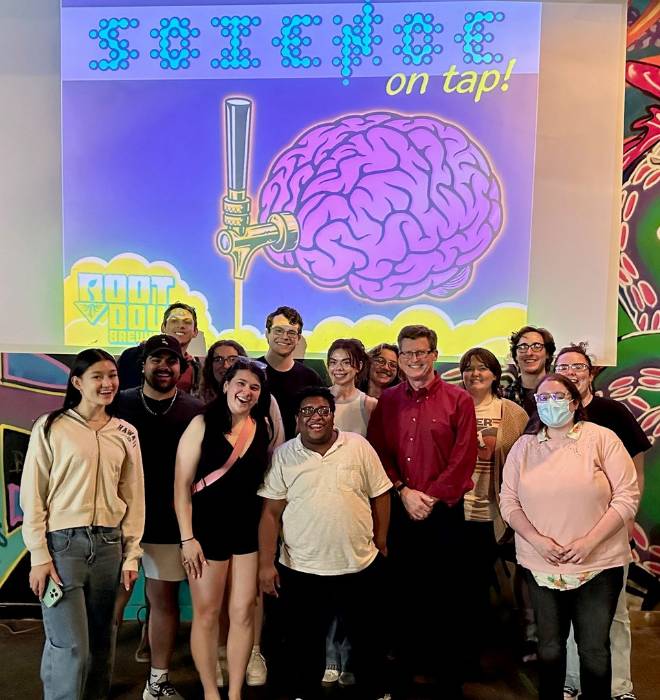
Science on Tap
Dr. Kolasinski spoke at Science on Tap, May 6th on What is a Chemical Bond? The presentation was followed by a lively round of questions from the audience, achieving one of its objectives of communicating science to a general audience. The organizers informed us that the WCU Chemistry Crew represented the largest ever student participation in all of the events they have held. A slightly shorter version of the talk is available to watch on YouTube. You can see how NBC News 10 reported on it here at this link.
Student Presentations at Pennsylvania Academy of Science
Chemistry students from Dr. Kwiatkowski’s lab presented their research at the 100th Annual Meeting of the Pennsylvania Academy of Science in Harrisburg.

Talk Delivered in the Chemistry Department at Drexel University
Dr. Kolasinski spoke at Drexel University's Department of Chemistry, April 10th on Exploring the reactivity of porous silicon and silica surfaces. This talk featured not only recent results but also reviewed techniques for producing porous silicon that were developed at WCU (ReEtching and iMACE). WCU undergraduate researchers who worked on results discussed in this talk include Brett Barclay, Jacob Gogola, Nathan Gimbar, Juliana Hetzel, Jordan Kautzsch, Neil Slichter, Joseph Swanson, and Bret Unger
Dr. Kolasinski presents at Gordon Research Conference on Chemical Reactions at Surfaces
Dr. Kolasinski presented a poster on "Radical Surface Chemistry of Silicon Oxides" at the Gordon Research Conference on Chemical Reactions at Surfaces in Ventura, CA. The presentation featured results generated by undergraduate researchers Juliana Hetzel (now graduated), and Jordan Kautzsch, along with co-workers at Stanford University Yangie Li and Richard N. Zare.
Dr. Chirdon awarded PRF Grant
Dr. Danielle Chirdon has been awarded an Undergraduate New Investigator grant from the American Chemical Society's Petroleum Research Fund. This grant will support her work in valorizing CO2 petroleum byproduct.
